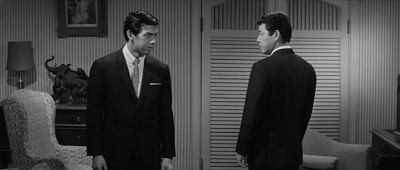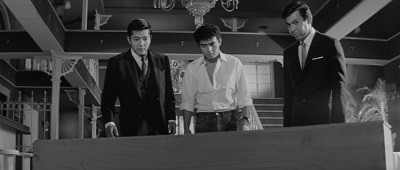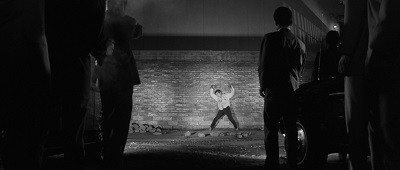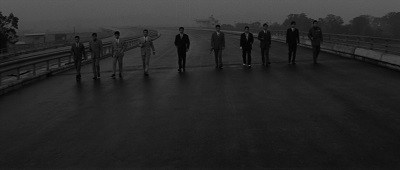| Reviews & Columns |
|
Reviews DVD TV on DVD Blu-ray 4K UHD International DVDs In Theaters Reviews by Studio Video Games Features Collector Series DVDs Easter Egg Database Interviews DVD Talk Radio Feature Articles Columns Anime Talk DVD Savant Horror DVDs The M.O.D. Squad Art House HD Talk Silent DVD
|
DVD Talk Forum |
|
|
| Resources |
|
DVD Price Search Customer Service #'s RCE Info Links |
|
Columns
|
|
|
Massacre Gun - Limited Edition (Combo Pack)
 The gangster films of director Seijun Suzuki, including Branded to Kill and Youth of the Beast, tend to evoke the erratic cool of jazz music with their off-beat editing and wild stylistic flourishes. Massacre Gun is a 1967 film by director Yasuharu Hasebe, who was mentored by Suzuki while he served as an assistant director, and it stars Suzuki's frequent leading man, the stern-faced, puffy-cheeked Jo Shishido. However, where Suzuki goes for the wild, exciting rhythms of jazz, Hasebe goes for the sorrowful wail of blues. Although the film delivers on the kind of fistfights and shootouts that the viewer will expect from a gangster picture, there's a surprisingly melancholy atmosphere to the film as it dives into the emotional complexities of integrity, friendship, and family.
The gangster films of director Seijun Suzuki, including Branded to Kill and Youth of the Beast, tend to evoke the erratic cool of jazz music with their off-beat editing and wild stylistic flourishes. Massacre Gun is a 1967 film by director Yasuharu Hasebe, who was mentored by Suzuki while he served as an assistant director, and it stars Suzuki's frequent leading man, the stern-faced, puffy-cheeked Jo Shishido. However, where Suzuki goes for the wild, exciting rhythms of jazz, Hasebe goes for the sorrowful wail of blues. Although the film delivers on the kind of fistfights and shootouts that the viewer will expect from a gangster picture, there's a surprisingly melancholy atmosphere to the film as it dives into the emotional complexities of integrity, friendship, and family.
Kuroda (Shishido) is a gangster working for Boss Akazawa (Takashi Kanda), a ruthless mobster who controls most of the city. When Akazawa asks Kuroda to wipe out a woman, he complies without question, killing her within the evening. He stays quiet about it, but his brothers Saburo (Jiro Okazaki) and Eiji (Tatsuya Fuji) both know that Akazawa has crossed a line: the woman not only loved Kuroda, but Kuroda loved her too. Furious, Saburo, who fights for Akazawa as an up-and-coming boxer, refuses to fight, so Akazawa breaks his fists. Before long, the tension between the three brothers and the crime lord has built into an all-out war. Kuroda regrets having to face off against Akazawa's legion of men, not because he has deep loyalty to Akazawa himself, but because his closest friend, Shirasaka (Hideaki Nitani) remains on Akazawa's side. Neither man wants to fight the other, but both realize a showdown is increasingly inevitable.
Gangsters becoming disillusioned with a life of crime is nothing new, but the way that Hasebe illustrates this with Kuroda feels rooted in Japanese cultural norms.  Kuroda feels a deep obligation to Akazawa; after murdering his lover, he's practically ashamed by his own feelings of remorse, but is not motivated to quit, clearly ready to bury his anger and heartbreak. It's only through the actions of his brothers -- first Saburo, then Eiji, who has a certain bloodlust -- that force him to act. In turn, Kuroda's actions force Shirasaka's hand, who knows that once Kuroda has started down the path, he will see it through (even aside from the inescapable repercussions from Akazawa).
Kuroda feels a deep obligation to Akazawa; after murdering his lover, he's practically ashamed by his own feelings of remorse, but is not motivated to quit, clearly ready to bury his anger and heartbreak. It's only through the actions of his brothers -- first Saburo, then Eiji, who has a certain bloodlust -- that force him to act. In turn, Kuroda's actions force Shirasaka's hand, who knows that once Kuroda has started down the path, he will see it through (even aside from the inescapable repercussions from Akazawa).
Shishido is a stoic actor, generally playing characters that hide secrets behind his intense gaze. Massacre Gun is a slight change of pace for him, finding the actor softening his vibe ever-so-slightly to reveal a more timid man under Kuroda's gangster exterior. Despite the lack of a single scene where we learn much of anything about Kuroda's lover, Shishido's performance convinces us of her innocence and virtue, and keeps her unwarranted death in the viewer's mind the entire movie. Okazaki and Fuji are also very good as the forces of melodrama drawing Kuroda into the action, Saburo out of concern for his brother's humanity, and Eiji out of concern for his brother's reputation. The trio travel around town, roughing up the owners of businesses paying off Akazawa, and seem to bond in the process. Meanwhile, Kuroda and Shirasaka only briefly meet, but exchange messages through Shirasaka's wife, who is sensitive to Kuroda's emotional turmoil.
Hasebe has a clean visual style reminiscent of Suzuki when it comes to blocking action, favoring clear, lengthy shots reminiscent of comic book panels that hit the viewer with distinct splashes of flair. His pacing, on the other hand, is much different from his mentor's, progressing through the story with a somewhat rigid consistency. The film is punctuated by blasts of violence, such as the sequence where the brothers go around putting pressure on Akazawa's rackets, or a shooting death involving a hail of bullets that would make even Muni's Scarface flinch. The film culminates in a spectacular shoot-out on an incomplete and deserted freeway, a literal and figurative end of the road. For some films, that would be enough of a climax, but the final moment is one of emotional anguish instead of violent triumph -- the sorrowful croon of Massacre Gun's cinematic blues song.
 The Blu-ray
The Blu-ray
Massacre Gun follows the design template of Arrow's UK releases, featuring reversible cover art with a newly-designed piece on the front by artist Ian McEwan (I vastly prefer this image to the one he did for Branded to Kill) of Shishido firing the "massacre gun" with a storm of gangster victims as a backdrop. The two-disc set contains both a DVD copy, and a booklet with an essay on the film by Jasper Sharp. The entire package comes in a thick, transparent Amaray case.
The Video and Audio
Arrow Video offers Massacre Gun in the form of a nice-looking 2.39:1 1080p AVC transfer, which shows signs of age but is generally strong. The picture is occasionally marred by the appearance of a white line at the top of the screen during edits (mostly near the beginning), and details are quite as sharp as some of the other 1960s Japanese films I've seen on Blu-ray, but it's hard to imagine previous presentations of the film on any home video medium (which may not have happened outside of Japan) looking anywhere near as clean and well-resolved. No banding or compression artifacts were noticeable, although some print damage is on display. A DTS-HD Master Audio 2.0 soundtrack is strong, with minimal echo or distortion and no noticeable hiss or significant crackling. Dialogue sounds fine and the gunfights have a ring to them in line with Clint Eastwood movies of the same era. English subtitles are provided.
The Extras
First up is a brand-new "Interview With Jo Shishido" (17:38), which finds the star reflecting mostly on his career as a whole, including what drew him to acting, what he liked about directors, which of his films he felt were his best, and elements of the filmmaking culture in the 1960s.  Little of the interview is focused on Massacre Gun specifically (he comments that they all blend together), but it's a fun chat just the same, even if it ends on a sad note (Shishido's house burned down, and he lost many of his memories from his career in the blaze).
Little of the interview is focused on Massacre Gun specifically (he comments that they all blend together), but it's a fun chat just the same, even if it ends on a sad note (Shishido's house burned down, and he lost many of his memories from his career in the blaze).
This is supplemented by an "Interview With Tony Rayns" (36:26). It too doesn't focus on Massacre Gun, with Rayns touching on the history of the Nikkatsu corporation (and its competitor, Shochiku), before diving into not just Massacre Gun but also touching on Retaliation (also upcoming for Arrow) and other Suzuki, Hasebe, and Shishido films. It's a great, informative piece for those interested in Japanese filmmaking from the 1960s.
The disc rounds out with a promotional gallery featuring photographs done for the posters and also from the film. There is also an original theatrical trailer, which features a significant amount of footage from A Colt is My Passport, a different Shishido film with an equally spectacular final shootout. It'd be a bait-and-switch if the one in Massacre Gun wasn't equally awesome. Both video extras are presented in HD.
Conclusion
Massacre Gun is not as breezy and bizarre as the films of Suzuki, but it's got a mood and atmosphere all its own. Thanks to Shishido, Okazaki, and Nitani, the film is surprisingly moving, and it still builds to one of the more spectacular final shootout's I've seen. Although the review will be incomplete until I can be sure the A/V I've seen here is final, this disc is definitely recommended.
Please check out my other DVDTalk DVD, Blu-ray and theatrical reviews and/or follow me on Twitter.
|
| Popular Reviews |
| Sponsored Links |
|
|
| Sponsored Links |
|
|
| Release List | Reviews | Shop | Newsletter | Forum | DVD Giveaways | Blu-Ray | Advertise |
|
Copyright 2024 DVDTalk.com All Rights Reserved. Legal Info, Privacy Policy, Terms of Use,
Manage Preferences,
Your Privacy Choices | |||||||












